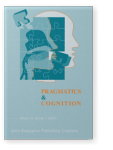Vol. 24:3 (2017) ► pp.373–403
Cognitive processing of scalar implicatures with Chinese gradable adjectives
In previous research comparing the Context-driven Model with the Default Model of meaning processing, the former was preferred. It predicts that contexts play an exclusively decisive role in meaning processing, whereas the latter holds that the inference of literal meaning generally goes through, unless it is subsequently defaulted or cancelled by the context it is associated with. The Standardization Model, which we added to our experiments, highlights that implicatures are figured out from standardized forms typically based on the mutual background belief and speaker’s intention. We tested whether Chinese people’s processing of the gradable adjective scale <hot, burning> conformed more to the Context-driven Model, the Default Model, or the Standardization Model. The results demonstrated that the Standardization Model is the most acceptable among the three. The findings of this study, which is the first study using the experimental paradigm on Chinese gradable adjectives, highlighted a need for further studies to investigate the same questions with different languages and cultures.
Article outline
- 1.Introduction
- 2.Theoretical background to the three processing models
- 2.1Theories for DM and CM with context dependency in focus
- 2.2Theories and assumptions for SM
- 2.3Assumptions to the three models in a neutral context
- 3.Noted studies testing the three models
- 3.1Studies on the Context-driven Model vs. the Default Model
- 3.2A study of the Standardization Model vs. the Default Model
- 4.Test materials of scalar implicature
- 5.Gradable adjectives under test
- 6.Method
- 6.1Experiment 1
- 6.1.1Participants
- 6.1.2Design
- Selection of gradable adjectives
- Context settings
- Test items
- 6.1.3Procedures
- Information registration
- Instruction
- Screen display
- Training items
- In-test monitoring
- Post-test interview
- Scalar implicature interpretation rate (SIIR)
- Response time (RT)
- Predictions
- 6.1.4Post-test interview and questionnaire
- 6.1.5Results
- Scalar implicature interpretation rate
- Response time
- Post-test interview
- 6.1.6Discussion
- Scalar implicature interpretation rate
- Response time
- Post-test interview
- 6.2Experiment 2
- 6.2.1Predictions
- 6.2.2Design
- Item changes
- Post-test questionnaire
- 6.2.3Participants
- 6.2.4Procedures
- 6.2.5Results
- Scalar implicature interpretation rate
- Response time
- Post-test questionnaire
- 6.2.6Discussion
- Scalar implicature interpretation rate
- Response times
- Post-test questionnaire
- 6.3Experiment 3
- 6.3.1Participants
- 6.3.2Design and procedure
- 6.3.3Results
- Scalar implicature interpretation rate
- Response time
- Post-test questionnaire
- 6.3.4Discussion
- Scalar implicature interpretation rate
- Response times
- Post-test questionnaire
- 6.1Experiment 1
- 7.General discussion and conclusion
- Acknowledgements
- Notes
-
References
